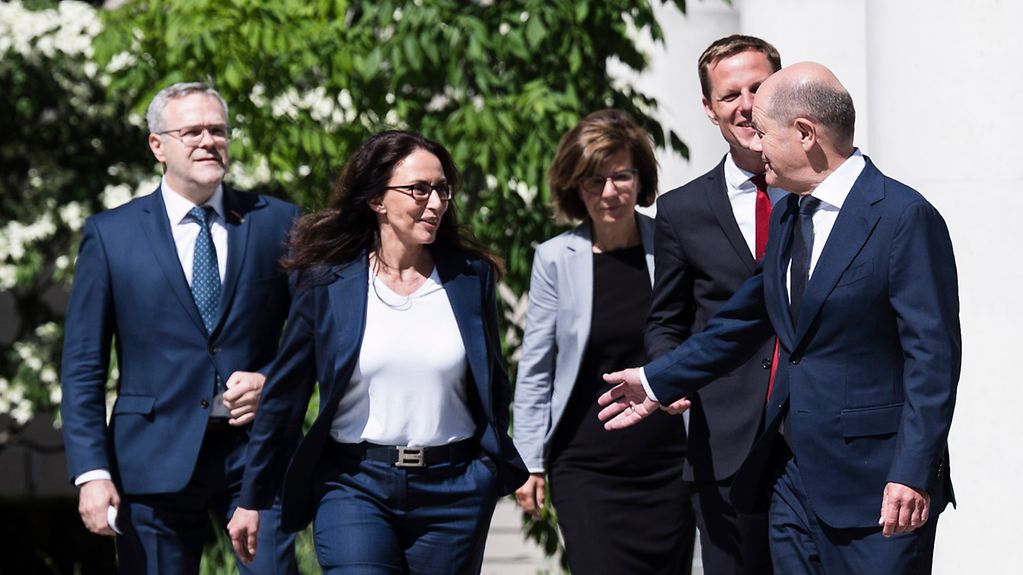Third meeting of the Alliance for Transformation
How can the shift towards climate neutrality be realised successfully? How can it be accelerated? And how can Germany safeguard its prosperity? Federal Chancellor Scholz invited representatives of the private sector, academia and civil society to discuss these questions with the Federal Government.
3 min reading time

“Linking climate protection and prosperity”: Federal Chancellor Scholz at the third meeting of the Alliance for Transformation at the Chancellery.
Photo: Federal Government/Steins
“The decade ahead will be decisive for Germany,” said Federal Chancellor Olaf Scholz after the third meeting of the Alliance for Transformation. He described the energy transition as a huge opportunity: “It is a driver of employment and growth.“
This was not about sacrifice, the Federal Chancellor pointed out, but about prudent answers to future-related questions. He added that joint efforts on the part of everyone involved and a broad alliance with business and society would enable us to safeguard and renew prosperity.
Established in the coalition agreement, the Alliance for Transformation is a digital dialogue platform offered by the Federal Government with the involvement of the private sector, social partners and academia. The goal is to join forces to shape the transition that is to make Germany climate neutral while increasing digitalisation and resilience.
Speeding up the energy transition
The focus of this third meeting was the question of how the development of renewable energies and the transformation of the economy towards climate neutrality could be accelerated. The expansion of production capacity and availability of qualified workers are key aspects in this context. Two task forces took up their work following the previous business summit held on 18 October 2022, and they now presented their results.
The participants agreed that tangible steps had to be taken in order to speed up change. These suggested steps include better planning reliability for businesses, as well as monitoring of the development of renewable energies, in order to keep track of the progress made and identify any shortcomings early on. Federal Chancellor Scholz also stressed that a sufficient number of skilled and motivated employees would be needed to realise the transition, adding that it was therefore important to recruit additional experts and young talent from Germany and abroad.
Strengthening capacity for innovation
Another key requirement for a successful transition was for Germany to maintain and increase its capacity for innovation, Scholz pointed out. The participants of the meeting discussed with experts how the German innovation system could be improved. “This is all about being at the forefront of these developments as an innovative country. This is what we want, and what we will achieve,” Federal Chancellor Scholz said. The issue will now be deliberated in a work process, too, and the results will be presented and discussed at the next meeting of the Alliance for Transformation in October.
Specific and open exchange
After the meeting, DGB President Yasmin Fahimi expressed her appreciation of the fact that transformation had been discussed specifically and openly by the Alliance. She went on to say that quick solutions and social acceptance of the transition were crucial. Trade President Jörg Dittrich added that there had been “critical and constructive” discussion of how an “agenda of confidence and courage” could be achieved.
The President of the German Association of Energy and Water Industries, Dr. Marie-Luise Wolff, pointed out that it was an achievement of the Federal Government that the development of renewable energies was picking up pace once again. This pace had to be increased further, she said. The President of the German Nature Conservation Ring, Kai Niebert, called for a “culture of cooperation”, as well as for “moderation in tone paired with acceleration where it really matters”.
Federal Chancellor Scholz hosted the meeting at the Chancellery. In addition to Vice-Chancellor Robert Habeck, Federal Minister for the Environment Steffi Lemke, Federal Labour Minister Hubertus Heil and the Head of the Chancellery, Wolfgang Schmidt, the meeting was attended by representatives of the private sector, academia and civil society.
More information about previous meetings of the Alliance for Transformation:
Second meeting in October 2022: “The next eight years will be crucial”
Launch in June 2022: “Focus on climate-neutral economy, digitalisation and sustainable work”